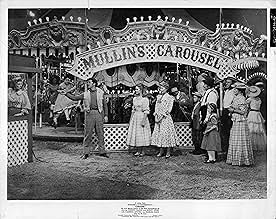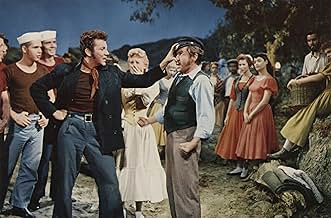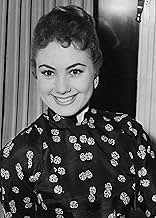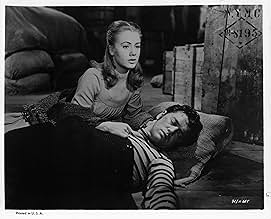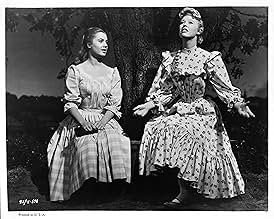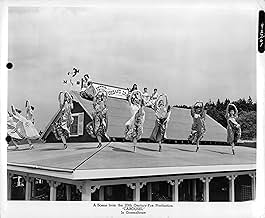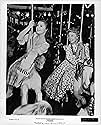Carousel
- 1956
- Tous publics
- 2h 8m
IMDb RATING
6.5/10
7.1K
YOUR RATING
Fifteen years after his death, a carousel barker is granted permission to return to Earth for one day to make amends to his widow and their daughter.Fifteen years after his death, a carousel barker is granted permission to return to Earth for one day to make amends to his widow and their daughter.Fifteen years after his death, a carousel barker is granted permission to return to Earth for one day to make amends to his widow and their daughter.
- Awards
- 1 win & 3 nominations total
William LeMassena
- Heavenly Friend
- (as William Le Massena)
Jacques d'Amboise
- Louise's 'Starlight Carnival' Dancing Partner
- (as Jacques D'Amboise)
Walter Bacon
- Graduation Spectator
- (uncredited)
Robert Banas
- Ruffian in Louise's Ballet
- (uncredited)
Tex Brodus
- Townsman
- (uncredited)
Buddy Bryan
- Dancer
- (uncredited)
Bob Calder
- Dancer
- (uncredited)
Harry Carter
- Third Policeman
- (uncredited)
Featured reviews
I have had the relatively rare privilege of performing "Carousel" on stage, uncut, and with a full orchestra. The original "Carousel" that Rodgers and Hammerstein wrote for the stage is practically an opera, employing extended musical scenes that cover great stretches of plot and character by alternating music and dialogue. When one sees the "Carousel" on stage (with good voices and the original orchestrations), one begins to understand why this is considered one of the greatest musicals ever written.
"Carousel" on film is not nearly as overwhelming. The story is still there, as are the songs, for the most part. But they are just songs in the movie, scenes distilled to the bare bones of the melody on which the original sequence was based. You don't get the feeling, after hearing them sung, that you have learned anything new about the characters (excepting, of course, Billy Bigelow's "Soliloquy" which is left entirely intact).
For example, the "If I Loved You" bench scene between Julie Jordan (Shirley Jones) and Billy Bigelow (Gordon MacRae) lasts almost fifteen minutes once the music starts. What the characters don't tell us about themselves, the music does, throwing melodies left and right until it finally culminates in the release of the famous love song. The scene has built up to this moment until it becomes the only way that Julie can tell Billy that she loves him. In the movie, however, it is all talk until Julie starts singing "If I Loved You". The song seems to come much more out of left field and does not seem nearly as satisfying. Billy repeats the song and the scene ends. As a result, their falling in love with each other doesn't make much sense because the scene really hasn't built up to it.
Several songs which delineate the supporting characters are either severely truncated (such as the musical/character sequence between Carrie Pipperidge (Barbara Ruick) and Enoch Snow (Robert Rounseville)) or cut entirely (such as "Blow High, Blow Low" which could have been a choreographer's dream). As for the choreography itself, surely "June is Bustin' Out All Over" could have been staged with a little more imagination instead of confining itself to the roof and deck of Nettie Fowler's spa. And it does feel confined. This is a song about abandoning the human spirit to the glories of the summer season, a feeling that covers much more territory than just a dining patio.
I do like the casting in the film, although I believe that they were badly underdirected. Gordon MacRae and Shirley Jones seem a little lost here. Their talent is not in question as evidenced by their stellar performances in the movie version of "Oklahoma!". Clearly this movie, which had the potential to be a cinema classic, was helmed by someone who didn't understand the genius of Rodgers and Hammerstein. In other words, don't try to fix what ain't broke.
"Carousel" on film is not nearly as overwhelming. The story is still there, as are the songs, for the most part. But they are just songs in the movie, scenes distilled to the bare bones of the melody on which the original sequence was based. You don't get the feeling, after hearing them sung, that you have learned anything new about the characters (excepting, of course, Billy Bigelow's "Soliloquy" which is left entirely intact).
For example, the "If I Loved You" bench scene between Julie Jordan (Shirley Jones) and Billy Bigelow (Gordon MacRae) lasts almost fifteen minutes once the music starts. What the characters don't tell us about themselves, the music does, throwing melodies left and right until it finally culminates in the release of the famous love song. The scene has built up to this moment until it becomes the only way that Julie can tell Billy that she loves him. In the movie, however, it is all talk until Julie starts singing "If I Loved You". The song seems to come much more out of left field and does not seem nearly as satisfying. Billy repeats the song and the scene ends. As a result, their falling in love with each other doesn't make much sense because the scene really hasn't built up to it.
Several songs which delineate the supporting characters are either severely truncated (such as the musical/character sequence between Carrie Pipperidge (Barbara Ruick) and Enoch Snow (Robert Rounseville)) or cut entirely (such as "Blow High, Blow Low" which could have been a choreographer's dream). As for the choreography itself, surely "June is Bustin' Out All Over" could have been staged with a little more imagination instead of confining itself to the roof and deck of Nettie Fowler's spa. And it does feel confined. This is a song about abandoning the human spirit to the glories of the summer season, a feeling that covers much more territory than just a dining patio.
I do like the casting in the film, although I believe that they were badly underdirected. Gordon MacRae and Shirley Jones seem a little lost here. Their talent is not in question as evidenced by their stellar performances in the movie version of "Oklahoma!". Clearly this movie, which had the potential to be a cinema classic, was helmed by someone who didn't understand the genius of Rodgers and Hammerstein. In other words, don't try to fix what ain't broke.
The film of this classic musical is a joy to watch and listen to.
The music is undoubtedly the finest Rodgers and Hammerstein
score.
Of the many fine moments in the film two astounding highlights
must be Billy's Soliloquy and the Shirley Jones' and Gordon
MacRae's lover's duet "If I loved you".
To this is added two great ballet sequences "June is Bustin' out all
Over" and Louise's ballet.
The film is Rogers and Hammerstein at their most dark and
introspective, which may account for the film's relatively lacklustre
reception at the time of its initial release but the at the same time
explains the ongoing appeal of this truly timeless classic film.
It is a fine memorial to both composer and lyricist and to the
artistry of Gordon MacRae whose performance of the soliloquy is
the benchmark against which all performances are judged.
The film was produced in Cinemascope 55 a large film fomat
which overcame many of the problems that were inherent in early
Cinemascope films (even though the film was actually released
only in standard 35mm form ..a bit like a 35mm print of a 70mm
film this still results in a far better image) and gives the film its
immaculate look.
The Fox DVD is crisp and the sound, though very clearly a 1950s
recording is clean and well balanced.
I just wish I could see this film in a cinema on the biggest of
screens... it would be an even more special experience!
The music is undoubtedly the finest Rodgers and Hammerstein
score.
Of the many fine moments in the film two astounding highlights
must be Billy's Soliloquy and the Shirley Jones' and Gordon
MacRae's lover's duet "If I loved you".
To this is added two great ballet sequences "June is Bustin' out all
Over" and Louise's ballet.
The film is Rogers and Hammerstein at their most dark and
introspective, which may account for the film's relatively lacklustre
reception at the time of its initial release but the at the same time
explains the ongoing appeal of this truly timeless classic film.
It is a fine memorial to both composer and lyricist and to the
artistry of Gordon MacRae whose performance of the soliloquy is
the benchmark against which all performances are judged.
The film was produced in Cinemascope 55 a large film fomat
which overcame many of the problems that were inherent in early
Cinemascope films (even though the film was actually released
only in standard 35mm form ..a bit like a 35mm print of a 70mm
film this still results in a far better image) and gives the film its
immaculate look.
The Fox DVD is crisp and the sound, though very clearly a 1950s
recording is clean and well balanced.
I just wish I could see this film in a cinema on the biggest of
screens... it would be an even more special experience!
Rodgers & Hammerstein's brilliant stage musical comes to the screen with most of the music intact--and what songs they are. Each one is a gem and fully integrated into the tragic storyline. Gordon MacRae stars as Billy Bigelow, the amusement park barker who tries to change his life when he marries Julie Jordan (Shirley Jones)-- with tragic results. MacRae's robust baritone is showcased in his big number, 'Soliloquy', performed at seaside with the ocean backdrop. Only occasionally is the use of stagebound sets a jarring note--but overall, the look and feel of the movie is one of genuinely moving musical drama.
Delightful performances from Barbara Ruick and Robert Rounseville as Mr. and Mrs. Snow. Their 'When The Children Are Asleep' is a charming highlight. Claramae Turner does an outstanding job on 'You'll Never Walk Alone'. Cameron Mitchell is a slyly villainous Jigger. Filming of the 'June Is Bustin' Out All Over' number in Boothsbay Harbor, Maine is a production highlight and choreographer's dream.
Gordon MacRae and Shirley Jones are in excellent voice for 'If I Loved You'. What more could you want? An exceptional movie musical that ranks with the best of Rodgers & Hammerstein's works.
Delightful performances from Barbara Ruick and Robert Rounseville as Mr. and Mrs. Snow. Their 'When The Children Are Asleep' is a charming highlight. Claramae Turner does an outstanding job on 'You'll Never Walk Alone'. Cameron Mitchell is a slyly villainous Jigger. Filming of the 'June Is Bustin' Out All Over' number in Boothsbay Harbor, Maine is a production highlight and choreographer's dream.
Gordon MacRae and Shirley Jones are in excellent voice for 'If I Loved You'. What more could you want? An exceptional movie musical that ranks with the best of Rodgers & Hammerstein's works.
This is the musical which gave Gordon MacRae his greatest solo song, namely the 7 minutes long "Soliloquy", in which Billy the circus barker speculates about his unborn child, first with bluster and pride if it is a boy, and then with insecurity and despair if it is a girl he can't buy things for. Billy, as we have seen in the opening sequence of the film, is telling his story to one of the angels in heaven, where he has gone after a violent and premature death. So we see his tale unfold, as he meets pretty little Julie Jordan (Shirley Jones, excellent), marries her, and through fate and bad luck, gets separated from her.
The subject matter is darker than Oklahoma (the film version of which also starred MacRae and Jones) but the sheer exuberance of songs such as "June is Bustin' Out All Over"; "A Real Nice Clambake"; "When The Children Are Asleep" and "If I Loved You", plus of course the best-known song from the show, "You'll Never Walk Alone" takes the story to another level and makes this film enjoyable to watch. Robert Rounsville makes a fine bombastic Mr Snow and has a fabulous voice; MacRae and Jones have their memorable duet to the lovely melody of Rodgers' score. There is also an excellent dance sequence, not as extensive as on stage, but still effective, where the daughter of Billy and Julie imagines an escape from her lonely and ostracised life.
The subject matter is darker than Oklahoma (the film version of which also starred MacRae and Jones) but the sheer exuberance of songs such as "June is Bustin' Out All Over"; "A Real Nice Clambake"; "When The Children Are Asleep" and "If I Loved You", plus of course the best-known song from the show, "You'll Never Walk Alone" takes the story to another level and makes this film enjoyable to watch. Robert Rounsville makes a fine bombastic Mr Snow and has a fabulous voice; MacRae and Jones have their memorable duet to the lovely melody of Rodgers' score. There is also an excellent dance sequence, not as extensive as on stage, but still effective, where the daughter of Billy and Julie imagines an escape from her lonely and ostracised life.
Shirley Jones is very believable as Julie Jordan, the lovely and ever patient mill worker who falls for a carousel barker, Billy Bigelow. With such heart felt ballads as "If I Loved You" and "You'll Never Walk Alone" it definitely ranks as one of the essential Hollywood musicals. Carousel is just about the only musical made during this period that deals with darker themes (i.e. date rape, domestic abuse). One could say that it even argues in favor of birth control. Carousel will never look dated because its themes are timeless and apply to the human spirit no matter what year it is. Everybody can identify with Billy to a degree and everybody can not help but feel a deep respect for Julie by the end of her personal journey. Fans of musical drama will treasure Carousel for years to come.
Did you know
- TriviaThe film was not successful at the box office despite the positive reviews, but the soundtrack album became a national best seller.
- Goofs(at around 59 mins) Billy Bigelow (Gordon MacRae) sings the "My Boy Bill" soliloquy on the beach. One minute and 17 seconds into the song, four jets fly over in formation in the upper left of the frame. This scene was filmed on the beach near Paradise Cove, Malibu, California, in 1955, when there were several operating Navy and Marine military bases in southern California.
- Crazy creditsA star hurtles downward and explodes in mid-air; out of this appears the credit "Twentieth Century-Fox presents Rodgers and Hammerstein's Carousel". The other credits all appear in a straightforward fashion.
- Alternate versionsIn the film's first two telecasts on ABC-TV in 1966, Mrs. Mullin's line "I don't run my business for a lot of sluts." followed by Carrie's retort "Who you calling a slut? Slut yourself!" and Julie says "Yeah, slut yourself!" was edited out. The line was kept on all local station telecasts of the film, and on all video releases.
- ConnectionsFeatured in King of the Movies (1978)
- SoundtracksThe Carousel Waltz
(1945) (uncredited)
Music by Richard Rodgers
Performed by the 20th Century-Fox Studio Orchestra Conducted by Alfred Newman
Details
- Release date
- Country of origin
- Language
- Also known as
- Rodgers and Hammerstein's Carousel
- Filming locations
- Boothbay Harbor, Maine, USA(scenes outside Nettie's Spa and in marina, including musical numbers "June Is Bustin' Out All Over" and "When The Children Are Asleep")
- Production company
- See more company credits at IMDbPro
Box office
- Gross worldwide
- $1,104
- Runtime
- 2h 8m(128 min)
- Color
- Aspect ratio
- 2.55 : 1
Contribute to this page
Suggest an edit or add missing content




